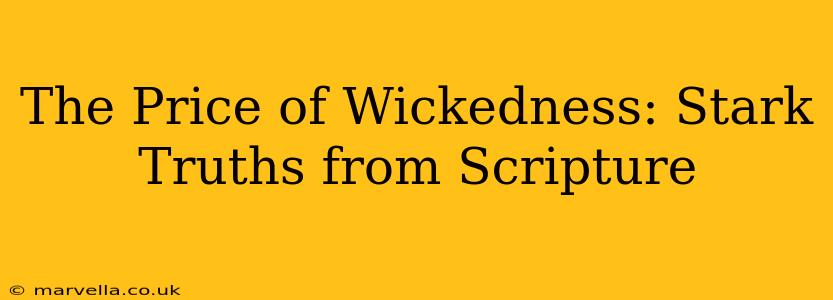The Price of Wickedness: Stark Truths from Scripture
The Bible, a collection of sacred texts revered by billions, doesn't shy away from depicting the consequences of wickedness. While grace and redemption are central themes, the scriptures also paint a stark picture of the price paid for choosing a path away from God. This exploration delves into the scriptural perspectives on the consequences of wickedness, examining both immediate and ultimate repercussions. We'll explore various facets of this complex topic, drawing on both Old and New Testament accounts to paint a comprehensive picture. Understanding these consequences isn't about fear-mongering; it's about appreciating the gravity of moral choices and the profound implications for our lives and eternity.
What are the consequences of wickedness in the Bible?
The Bible portrays the consequences of wickedness on multiple levels – personal, relational, and ultimately, spiritual. The effects aren't always immediate or easily discernible, but the overarching narrative consistently underscores the destructive nature of sin. This includes physical, emotional, and societal ramifications. We see examples throughout scripture, from the downfall of individuals like King David to the destruction of entire civilizations. The consequences are multifaceted and deeply intertwined, highlighting the intricate web of cause and effect within God's design.
What does the Bible say about the wages of sin?
Romans 6:23 famously states, "For the wages of sin is death, but the gift of God is eternal life in Christ Jesus our Lord." This verse encapsulates a central theme: sin's ultimate consequence is spiritual death – separation from God. However, it's crucial to understand that "death" encompasses more than physical demise. It implies a spiritual disconnect, a broken relationship with the divine, resulting in inner turmoil and emptiness. This spiritual death can manifest in various ways during earthly life, often leading to destructive patterns and relationships.
How does wickedness affect relationships?
Wickedness invariably strains and destroys relationships. Consider the fractured family dynamics depicted in numerous biblical narratives – from Cain and Abel's tragic conflict to the consequences of Jacob's deceitful actions. Dishonesty, selfishness, and pride erode trust, leading to broken bonds and lasting pain. The Bible emphasizes the importance of love, forgiveness, and reconciliation, but it also highlights the irreparable damage wickedness can inflict on interpersonal connections. These fractured relationships extend beyond immediate family and friends; they can affect entire communities and even nations.
What are some examples of wickedness in the Bible and their consequences?
Numerous biblical examples illustrate the repercussions of wickedness. The story of Sodom and Gomorrah serves as a potent reminder of God's judgment on widespread immorality and injustice. King Saul's disobedience, marked by pride and self-reliance, led to his downfall and ultimately his death. These instances demonstrate that wickedness, regardless of the perpetrator's status or power, carries serious consequences. The consequences were not simply personal; they affected entire nations and generations. The narratives serve as cautionary tales, emphasizing the far-reaching consequences of choices made against God’s will.
Does God forgive wickedness?
While the Bible clearly outlines the consequences of wickedness, it also powerfully conveys God's immense love, grace, and mercy. The central message of Christianity revolves around God's willingness to forgive and restore those who repent. Through Jesus Christ's sacrifice on the cross, humanity is offered redemption and the opportunity for a renewed relationship with God. Forgiveness, however, is not automatic; it requires genuine repentance, a turning away from sin, and a commitment to following God's path. This underscores that while the price of wickedness is significant, God's grace offers a path to healing and restoration.
Conclusion: Navigating the Path of Righteousness
Understanding the price of wickedness, as revealed in scripture, isn't about living in fear but about making informed choices. It's about appreciating the gravity of our actions and striving to live a life that honors God and reflects His love. The Bible offers a path of righteousness, a guide for navigating life's complexities, and a promise of redemption for those who seek it. By studying scripture and reflecting on these profound truths, we can make choices that lead to a fulfilling and meaningful life, both now and in eternity.

